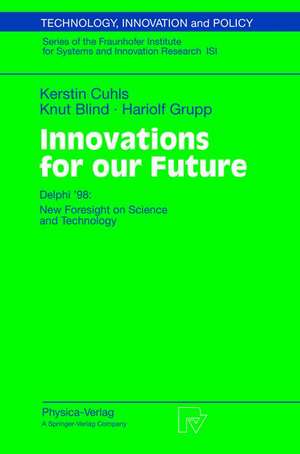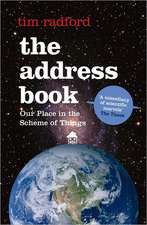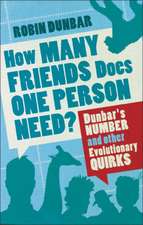Innovations for our Future: Delphi ’98: New Foresight on Science and Technology: Technology, Innovation and Policy (ISI), cartea 13
Autor Kerstin Cuhls Contribuţii de H. Bradke Autor Knut Blind Contribuţii de C. Dreher Autor Hariolf Grupp Contribuţii de D.M. Harmsen, H. Hiessl, B. Hüsing, G. Jaeckel, U. Schmoch, P. Zocheen Limba Engleză Paperback – 9 oct 2001
Preț: 387.75 lei
Nou
Puncte Express: 582
Preț estimativ în valută:
74.19€ • 77.67$ • 61.39£
74.19€ • 77.67$ • 61.39£
Carte tipărită la comandă
Livrare economică 07-21 aprilie
Preluare comenzi: 021 569.72.76
Specificații
ISBN-13: 9783790814347
ISBN-10: 3790814342
Pagini: 288
Ilustrații: XV, 271 p. 84 illus.
Dimensiuni: 155 x 235 x 15 mm
Greutate: 0.41 kg
Ediția:Softcover reprint of the original 1st ed. 2002
Editura: Physica-Verlag HD
Colecția Physica
Seria Technology, Innovation and Policy (ISI)
Locul publicării:Heidelberg, Germany
ISBN-10: 3790814342
Pagini: 288
Ilustrații: XV, 271 p. 84 illus.
Dimensiuni: 155 x 235 x 15 mm
Greutate: 0.41 kg
Ediția:Softcover reprint of the original 1st ed. 2002
Editura: Physica-Verlag HD
Colecția Physica
Seria Technology, Innovation and Policy (ISI)
Locul publicării:Heidelberg, Germany
Public țintă
ResearchCuprins
1 History and Basic Methods.- 1.1 What can we know about the future?.- 1.2 On the history of modern foresight.- 1.3 From forecasting to foresight.- 1.4 Methodological tool-kit of foresight.- 1.5 Forward looking over time: the career of the Delphi method.- 1.6 Benefits of foresight in general.- 2 Outline of the Second Comprehensive Outline of Delphi Study in Germany.- 2.1 What are the key questions?.- 2.2 Organisation of the Delphi process.- 2.3 Questionnaire.- 2.4 Who was surveyed?.- 2.5 Method of calculation and formulae used.- 3 Aggregated Assessments across all Subject Areas.- 3.1 Expertise of the experts taking part.- 3.2 Importance of the Delphi topics.- 3.3 Expected time of realisation of the visions.- 3.4 Germany’s position in research and development: self-perception.- 3.5 What measures should be taken?.- 3.6 Which areas of life are threatened by problems resulting from innovations?.- 3.7 Identical topics in several subject areas.- 3.8 What lies ahead? An overview.- 4 The Subject Areas.- 4.1 Information and Communication.- 4.2 Service and Consumption.- 4.3 Management and Production.- 4.4 Chemistry and Materials.- 4.5 Health and Life Processes.- 4.6 Agriculture and Food.- 4.7 Environment and Nature.- 4.8 Energy and Resources.- 4.9 Construction and Living.- 4.10 Mobility and Transport.- 4.11 Space.- 4.12 Big Science Experiments.- 5 Megatrends: Stereotyped Thinking Pattern of the Experts?.- 5.1 Megatrends in Delphi ‘98 and their influence on science and technology.- 5.2 Factor analysis to determine R&D experts’ attitudes.- 5.3 Similarities and differences in the estimation of the future development of science and technology.- 5.4 Different estimations concerning innovation fields — A selection.- 5.5 Selected topics with significantly different estimationsby the expert types.- 6 Comparison of the Asessments between Delphi ‘98 and Former Studies.- 7 German-Japanese Comparison.- 7.1 All topics.- 7.2 Information and Communication.- 7.3 Services and Consumption.- 7.4 Management and Production.- 7.5 Chemistry and Materials.- 7.6 Health and Life Processes.- 7.7 Agriculture and Food.- 7.8 Environment and Nature.- 7.9 Energy and Resources.- 7.10 Construction and Living.- 7.11 Mobility and Transport.- 7.12 Space.- 7.13 Big Science Experiments.- 8 Selected Methodological Problems.- 8.1 The application of Delphi ‘98 results.- 8.2 New foresight paradigms in comparing recent national activities in foresight?.- 8.3 Choice of experts.- 8.4 The integration of existing foresight activities.- 8.5 New foresight approaches.- 8.6 Databases as a means of foresight.- 8.7 Why do politics, academia, and business need assessment and foresight?.- 9 Outlook.- 9.1 Foresight in Germany: FUTUR’s second start.- 9.2 Challenges of tomorrow.- Literature.




























